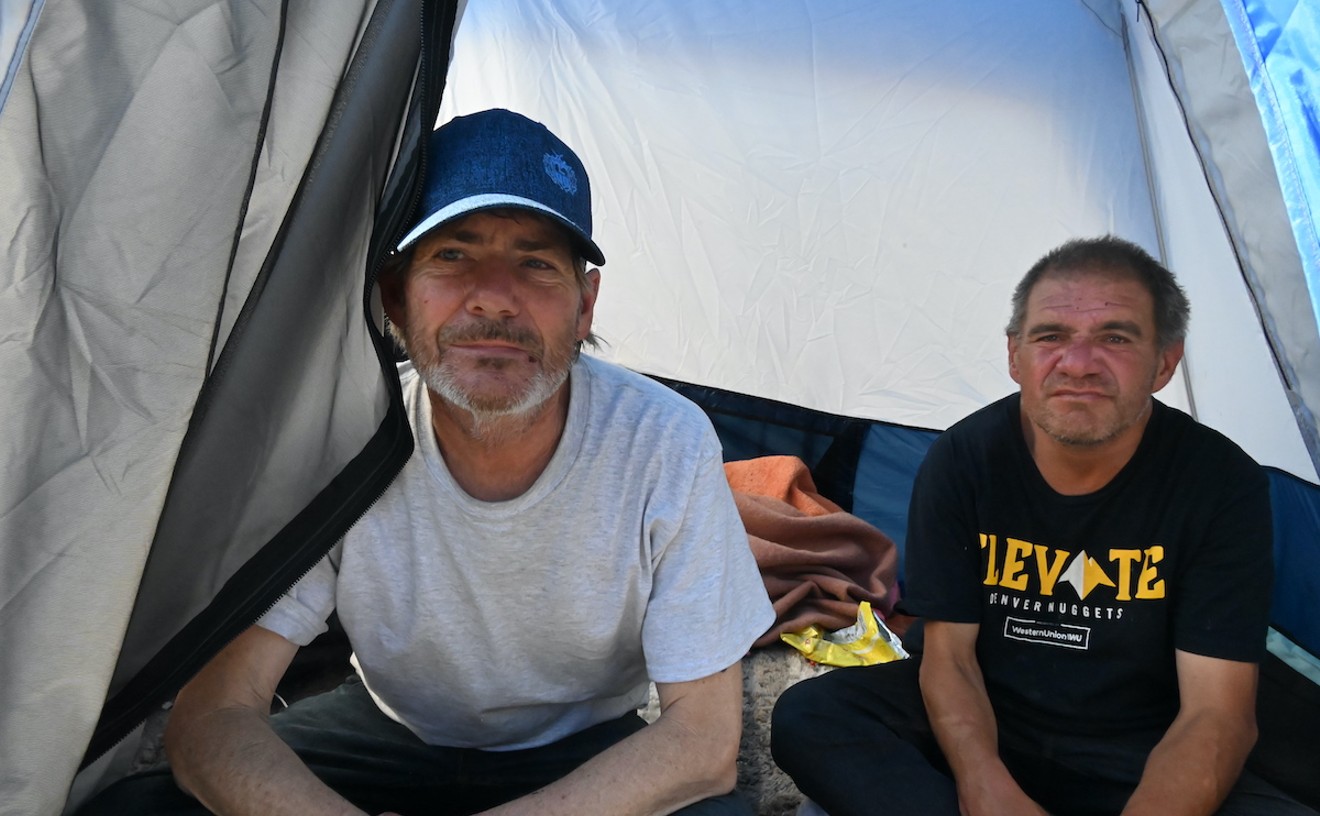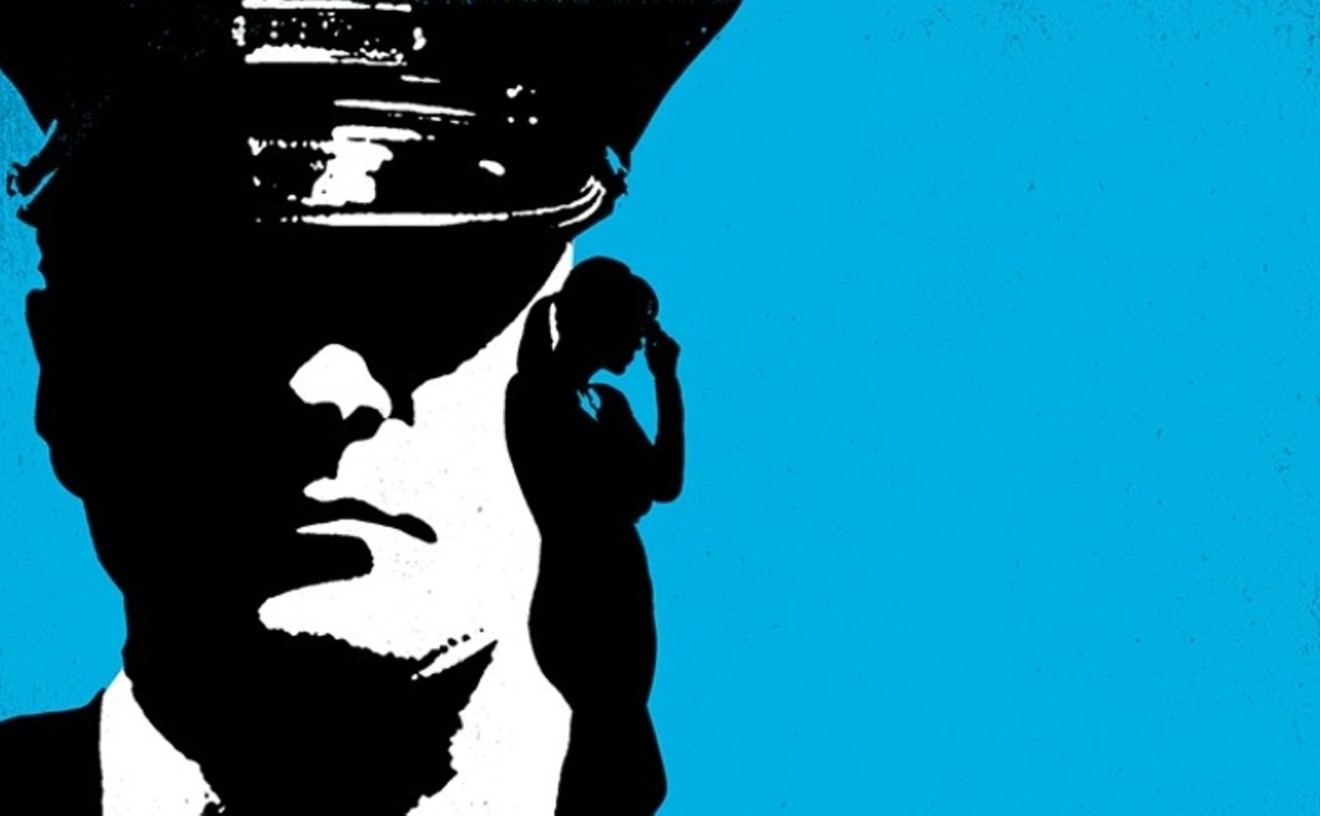Even though his love of skiing prompted his move to Aspen three years ago, Jay seems more like a young banker than a fun-loving ski-town dude. For a visit to his lawyer's office in downtown Denver, he wears a charcoal suit, white oxford-cloth shirt, red tie and black patent-leather shoes. Waiting to give a deposition, he reads the Wall Street Journal.
Just 26 years old, Jay has already launched his own business, selling maps of the mountains to tourists. A former Colorado State University economics student, he speaks with authority on writing a business plan, finding investors and looking for expansion markets.
But that's not why Jay's visiting his lawyer today. He's here because he filed a lawsuit in April 2001 over an alleged breach of contract concerning a job offer. However, the litigation, which is currently pending in Pitkin County District Court, doesn't involve back wages or stock options or benefits.
Or perhaps it does involve benefits -- depending on whose story you believe. In its crudest sense, this lawsuit is about blow jobs.
Employers in Aspen, a town full of trust-funders and celebrities, have been known to make unusual requests of new hires. But even for Aspen, this alleged request was going too far. Before the kink surfaced, Jay says, he thought he'd found the perfect position, one that would give him both the time and money to launch his business -- as well as some extraordinary extras.
Jay claims he was approached by 54-year-old John Ortega, an employee of the Dillard family, the department-store owners, and asked if he would be interested in a position as a caretaker at their house in Aspen. The job paid $25 an hour and included a free studio apartment. But between doing the dishes and sorting the laundry, Jay claims, Ortega told him he'd have one other duty: Ortega, who was supervisor of the property, had a little "hangup" and would want to work it out by occasionally performing fellatio on his new hire.
Jay's interest in the position ended there -- but his outrage didn't, and he filed suit against Ortega and his employers, William Dillard II and Mandy Dillard.
Ortega has denied both offering Jay a job and making any demand for sexual favors; the Dillards say they know nothing about the situation. Initially scheduled for trial this week, the case has been postponed. But already, Aspen is gossiping about the bizarre story emerging in court filings, with tales of young men being approached with fabulous job offers, discreet inquiries being made about sexual pastimes, and a gun carried around in a bag labeled "Capitalist Tool."
Like many people who fall in love with Colorado, Jay grew up in the flatlands of the Midwest.
He left the suburbs of Indianapolis to enroll at CSU, looking forward to indulging his love of skiing and hiking. After spending a semester as an exchange student in Prague in 1998, Jay decided that he wanted to start his own business and that Aspen would be the place to do it. He took a day job in a ski shop, Surefoot, while working on his fledgling map venture in his spare time.
"Fitting ski boots was a lot of work, but it was fun," says Jay. "We got ski breaks during the day. I'd work all day and then go home and work on the business."
According to Jay's lawsuit, Ortega walked into Surefoot one day in December 1999 and explained that he worked for the Dillard family, the Little Rock, Arkansas-based department-store moguls who have owned a home in Aspen for years. Mandy Dillard, the socialite who heads up the female side of the family, was having a problem with her ski boots, and Ortega was looking for someone to help her. Jay says that he talked with Ortega and offered to assist Dillard, who soon arrived at the store with her ski instructor.
A few days later, Jay says, Ortega returned to Surefoot and told him that Mandy Dillard had liked him so much that she wanted to know if he might want to work for the family. Ortega showed up at the ski shop several more times over the next two months, Jay remembers, and finally took him to lunch to discuss a possible job. Ortega insisted on paying for lunch, telling Jay that the Dillards always take care of their employees. The job arrangement Ortega described would involve not only a salary and free rent, but also use of the Dillards' vehicles in Aspen and a chance for Jay to host his own family in the Dillard house when they visited. Even more tantalizing, Jay remembers, was Ortega's suggestion that he'd be able to hop rides on the Dillards' jet and helicopter, holiday at their vacation homes when they weren't using them, and enjoy a fabulous lifestyle tending to the rich and famous. While the Dillards were in town, Jay would be expected to clean the house, arrange for fresh flowers and other necessities, and help serve dinner and cocktails.
During their discussions, Jay claims, Ortega also talked about his past employment with the Forbes family on the Trinchera Ranch near Fort Garland; he hinted that if Jay accepted the Dillard job, he might have access to the Forbes family airplane, as well.
Jay finally decided to accept the job. To seal the deal, he met Ortega for breakfast at the Wienerstube, a longtime Aspen hangout -- and it was there, Jay says, that Ortega told him about the additional job requirement. Ortega started talking about his little "hangup" with oral sex, one that Jay would have to help him with. Not that Jay would have to perform fellatio -- he remembers being told that he'd just have to let Ortega perform it on him.
According to Jay, when he declined Ortega's offer, the Dillards' supervisor apologized and said that should not stop Jay from moving into the house. They met again a week later to discuss the job, Jay says -- but once again, Ortega insisted that the position involved oral sex, according to the lawsuit. When Jay refused a second time, the employment offer was withdrawn.
Jay called his family back in Indiana. "They're the ones I had to turn to and say, 'Listen. This is what happened, and you're not going to believe it,'" Jay remembers. "I talked to them and said, 'What should I do?' I talked to my family about what's the right thing to do and the wrong thing to do."
As a result of that conversation, Jay contacted David Miller, a Denver attorney. Miller sent Bill Dillard a letter in July 2000, outlining Jay's allegations against Ortega.
"Mr. Jay feels that something has to be done," Miller wrote. "It is not acceptable for anyone to use their position of power to impose so grossly on the dignity as well as on the legal rights of others."
After opening the letter, he threw it in the trash, Dillard reported in a court filing.
Eventually, Jay decided to file suit, naming Ortega as well as the Dillards. The suit, which asks for an unspecified amount of damages, claims not only breach of a contract, but outrageous conduct by Ortega, as well as negligent supervision by the Dillards. Jay says the experience hurt him financially and emotionally.
Because Aspen has a town ordinance banning discrimination based on sexual preference, the complaint also alleges that Jay was discriminated against as a heterosexual man when he refused Ortega's overtures.
Ortega insists that he never offered Jay a job or made any demands for sexual favors of any kind. In a deposition he gave this spring, Ortega asserted that he is heterosexual and has never had a homosexual experience.
"He absolutely denies all the allegations," says Ortega's attorney, Mark Kane. "This has been very upsetting to him." Kane says he doesn't want to comment further on the case before it goes to trial. Ortega did not respond to a request for an interview.
For their part, the Dillards have insisted in court filings that they never authorized Ortega to hire an additional employee and that any such offer was made without their consent. There is room for only one caretaker on the property, they said, adding that they never told Ortega they wanted another employee. Mandy Dillard also said that while she had made several visits to Surefoot, she did not recall meeting any specific employee of the store.
John Ortega has worked for the Dillards for the past ten years, earning $5,000 a month to oversee their home, cook, arrange for needed maintenance and do whatever else is necessary to keep the house in shape. The home is in a choice spot near the ski mountain, and the Dillards visit several times a year, often bringing along guests. The five-bedroom split-level house was built in the 1980s and has an assessed value of $2.8 million.
Mandy and Bill Dillard inherited part of a business started by Bill Dillard Sr., the late family patriarch who opened a retail store in Nashville, Arkansas, in 1938. Today Dillard's has 342 stores stretching from Florida to California. The family still controls much of the firm's stock, and family members are in key executive positions; William Dillard II is the company's CEO.
Ortega, who remains on the payroll, says he's proud to be associated with such a prominent family, according to court documents.
Before he worked for the Dillards, Ortega was employed for many years by the late publishing magnate Malcolm Forbes, he said in depositions. The Forbes family has owned a ranch in the San Luis Valley for over thirty years. According to court documents, Ortega says he met Malcolm Forbes at the Broadmoor Hotel in Colorado Springs in the 1970s, when Ortega was working there as an assistant chef after having served in the military. (Ortega also said he'd studied cooking at the famed Cordon Bleu school.)
Known for flaunting his wealth, Forbes entertained celebrity friends like Elizabeth Taylor on his 151-foot yacht, The Highlander, and jetted around the globe in his private 727, named Capitalist Tool. Besides the ranch in Colorado, he owned a forty-acre estate in New Jersey, a palace in Tangier, a chateau in Normandy and an island in Fiji. He set six world records in hot-air ballooning, and his love of Harleys led him to pose for the cover of Outlaw Biker magazine.
After Forbes's death, in 1990, stories of his hidden homosexual life emerged. The Economist magazine described him as "one of America's richest and most flamboyant closet homosexuals." Tales of his fondness for attractive young men and wild parties appeared in books and magazines.
In depositions, Ortega testified that he carried a gun when he worked at the Forbes ranch in order to protect the guests. He also said that until recently, he owned several guns -- including a high-powered hunting rifle, an antique rifle and a nine-millimeter pistol he carried around in a bag labeled "Capitalist Tool."
According to court documents, Ortega had the pistol with him when he met with Matt Jay. According to Jay, Ortega told him he had been a member of the elite Navy SEALs in the 1960s. (A spokesman for the U.S. Navy says it is policy to neither confirm nor deny whether someone served in the SEALs.) Ortega's military record has become an issue in the lawsuit. Jay claims that because of Ortega's military background and his habit of carrying a concealed weapon, he feared for his life -- and that's relevant to his claim for emotional damages. According to Kane, Ortega suffers from post-traumatic stress disorder as a result of his time in the military and is being treated for the condition.
At one point during a deposition, Ortega lashed out at Miller when he began asking him about his time in the military. "Don't you ask me about the military!" he yelled, leaping out of his chair and shaking his finger at Jay's attorney. "I did nothing wrong. I'm sick and tired of this. My government didn't abuse me, but you can? The hell with you!"
Ortega had gotten rid of his guns on the advice of his doctors, who feared he would "do something foolish," he testified. He also said that his mental health has deteriorated as a result of the lawsuit and that he becomes upset when he goes out to eat in Aspen and sees waiters looking in his direction and whispering about him.
Jay is not the only young man to accuse Ortega of linking employment with the Dillards to sexual favors. A former Aspen resident, Jason Short, has filed an affidavit in connection with Jay's case, saying he met Ortega when he worked at Aspen's Vectra Bank in mid-1999. Ortega also offered him a job as a caretaker at the Dillards' house, Short says, with a free apartment and other perks. Short planned to begin working for the Dillards on February 1, 2000, and gave up his own apartment January 22, with the expectation that he would soon move into the house.
"Then on January 26 Mr. Ortega called me and told me that my becoming the Dillard's caretaker was not going to work out," Short says in his affidavit. "He gave me no reason why he thought it was not going to work out, but during our talks he asked me whether I was gay. I have been told that he inquired about whether I was gay from a person at the bank. He asked me if 'backrubs' would be something I would be comfortable with, and my response was 'no.' I felt it was odd of him to ask me about 'backrubs,' but it didn't become totally clear to me he was wanting to engage in homosexual activity until later when Ms. Lisa Barcellona informed me of his inquiries. It became clear to me that he was asking me whether he would be able to engage in a homosexual relationship of some type with me, but it didn't click in my mind until later. It was also clear to me, and I believe, that Mr. Ortega withdrew the offer he had made to me to be the Dillards' caretaker because I told him I was not gay and would not allow him to give me 'backrubs.'"
Lisa Barcellona, who worked with Short at the bank, also filed an affidavit with the court, saying that Ortega had approached her and asked if Short was gay.
Aspen passed a municipal ordinance banning discrimination based on sexual orientation in 1977, becoming one of the first cities in the country to have such a law. Those who violate the ordinance can be fined up to $1,000. In the years since the law has been in effect, though, there have not been any complaints of discrimination based on sexual orientation filed with the City of Aspen.
Jay cites the ordinance in his lawsuit, claiming that Ortega's alleged actions were illegal under local law and that he is therefore entitled to compensation from the Dillards. But last month, the Dillards' attorney told the court that the Aspen ordinance was irrelevant.
"The ordinance does not provide protection to persons who refuse to engage in a sex act," wrote attorney Brent Carlson as part of a motion for summary judgment. "It is clear from the deposition testimony of the plaintiff that the alleged discrimination was not based on his sexual orientation (a heterosexual). Plaintiff testified that he was told by defendant Ortega that he 'had the job' after he had told Mr. Ortega that he was a heterosexual. It was not until the plaintiff allegedly told Mr. Ortega that he would not allow Mr. Ortega to perform oral sex on him that he supposedly lost the job. The ordinance would protect nothing more than the plaintiff's status as a heterosexual, and according to the plaintiff's own testimony, Mr. Ortega's knowledge of the plaintiff's heterosexual status was not the impetus for the alleged loss of the job."
Miller insists that Aspen's ordinance does cover this situation, however, and that the prohibition on discrimination based on sexual orientation clearly applies to an interaction between two men of different persuasions.
"From our perspective, the way to look at it is as sex discrimination -- whether it's homosexual or heterosexual -- and it is prohibited by law," says Miller. "It's the same as if a person who was straight was demanding sexual favors for work. This happens to be the flip side of the coin."
Judge Thomas Ossola has not yet ruled on the defense's motion for summary judgment. The trial is now set for next spring.
"This is the last thing I ever wanted," says Jay. "But the issue is right and wrong, and what they're doing is clearly wrong." Still, he isn't waiting for a verdict to get on with his life and is pursuing his map venture as well as litigation. He's even hired part-time employees to market the guides, which include advertising from local businesses. Jay plans to expand his enterprise to other cities.
"The name 'Aspen' has more name recognition than any other ski area in the country," says Jay. "If I can create a viable product and prove its worth in Aspen, I can take it to other places."
He's always been ambitious. As a teenager in Indianapolis, he started a landscape service and carefully invested his earnings. He used that money to launch the current venture; since then, he's befriended several businesspeople in Aspen who have become mentors and helped him with the business.
"There's a lot of smart, successful businessmen in Aspen," he says.
He may be one of them.










